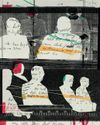
Katja Grace’s apartment, in West Berkeley, is in an old machinist’s factory, with pitched roofs and windows at odd angles. It has terra-cotta floors and no central heating, which can create the impression that you’ve stepped out of the California sunshine and into a duskier place, somewhere long ago or far away. Yet there are also some quietly futuristic touches. High-capacity air purifiers thrumming in the corners. Nonperishables stacked in the pantry. A sleek white machine that does lab-quality RNA tests. The sorts of objects that could portend a future of tech-enabled ease, or one of constant vigilance.
Grace, the lead researcher at a nonprofit called A.I. Impacts, describes her job as “thinking about whether A.I. will destroy the world.” She spends her time writing theoretical papers and blog posts on complicated decisions related to a burgeoning subfield known as A.I. safety. She is a nervous smiler, an oversharer, a bit of a mumbler; she’s in her thirties, but she looks almost like a teen-ager, with a middle part and a round, open face. The apartment is crammed with books, and when a friend of Grace’s came over, one afternoon in November, he spent a while gazing, bemused but nonjudgmental, at a few of the spines: “Jewish Divorce Ethics,” “The Jewish Way in Death and Mourning,” “The Death of Death.” Grace, as far as she knows, is neither Jewish nor dying. She let the ambiguity linger for a moment. Then she explained: her landlord had wanted the possessions of the previous occupant, his recently deceased ex-wife, to be left intact. “Sort of a relief, honestly,” Grace said. “One set of decisions I don’t have to make.”
This story is from the March 18, 2024 edition of The New Yorker.
Start your 7-day Magzter GOLD free trial to access thousands of curated premium stories, and 9,000+ magazines and newspapers.
Already a subscriber ? Sign In
This story is from the March 18, 2024 edition of The New Yorker.
Start your 7-day Magzter GOLD free trial to access thousands of curated premium stories, and 9,000+ magazines and newspapers.
Already a subscriber? Sign In

GET IT TOGETHER
In the beginning was the mob, and the mob was bad. In Gibbon’s 1776 “Decline and Fall of the Roman Empire,” the Roman mob makes regular appearances, usually at the instigation of a demagogue, loudly demanding to be placated with free food and entertainment (“bread and circuses”), and, though they don’t get to rule, they sometimes get to choose who will.

GAINING CONTROL
The frenemies who fought to bring contraception to this country.

REBELS WITH A CAUSE
In the new FX/Hulu series “Say Nothing,” life as an armed revolutionary during the Troubles has—at least at first—an air of glamour.

AGAINST THE CURRENT
\"Give Me Carmelita Tropicana!,\" at Soho Rep, and \"Gatz,\" at the Public.

METAMORPHOSIS
The director Marielle Heller explores the feral side of child rearing.

THE BIG SPIN
A district attorney's office investigates how its prosecutors picked death-penalty juries.

THIS ELECTION JUST PROVES WHAT I ALREADY BELIEVED
I hate to say I told you so, but here we are. Kamala Harris’s loss will go down in history as a catastrophe that could have easily been avoided if more people had thought whatever I happen to think.

HOLD YOUR TONGUE
Can the world's most populous country protect its languages?

A LONG WAY HOME
Ordinarily, I hate staying at someone's house, but when Hugh and I visited his friend Mary in Maine we had no other choice.

YULE RULES
“Christmas Eve in Miller’s Point.”